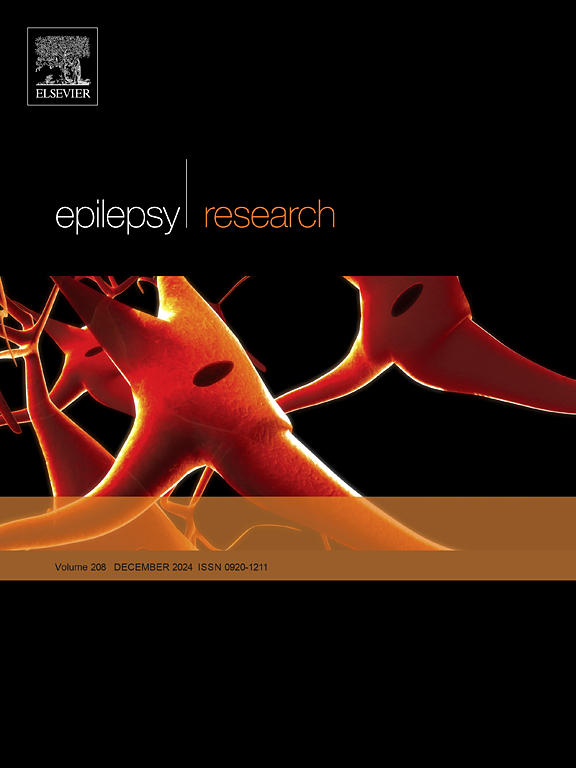Attention-deficit/hyperactivity disorder in adults with epilepsy: Preliminary prevalence and associated factors in a Czech sample
IF 2
4区 医学
Q3 CLINICAL NEUROLOGY
引用次数: 0
Abstract
Objective
This study investigated the prevalence of Attention-Deficit/Hyperactivity Disorder (ADHD) symptoms in Czech adult people with epilepsy (PWE) and examined factors potentially contributing to the co-occurrence of these two conditions. Although previous research has consistently reported elevated rates of ADHD in epilepsy populations, data from adult samples in Czech Republic remain limited.
Methods
Fifty-six adults with epilepsy completed validated self-report questionnaires assessing ADHD symptoms (ASRS), anxiety (GAD-2), and depression (NDDIE-2). Epilepsy-related clinical factors, such as seizure frequency, anti-seizure medication (ASM), type of epilepsy and epilepsy duration, were also analyzed in relation to ADHD symptoms.
Results
A high prevalence of ADHD symptoms n = 25 (44.6 %) was found in the sample. No significant associations were observed between ADHD symptoms and epilepsy-related variables or depressive symptoms, but a regression model of clinical and sociodemographic variables can explain 34.2 % of the variance in ASRS scores (Adj. R² = 0.342), with only anxiety emerging as a significant predictor (β = 0.517, SE = 0.50, t = 3.23, p = .003).
Conclusion
These preliminary findings suggest a possible link between epilepsy and ADHD, which may be further explored in future research through shared emotional or neurobiological mechanisms. The results underscore the need for integrated screening approaches and further research into the co-occurrence of epilepsy and ADHD in adult populations.
成人癫痫患者的注意缺陷/多动障碍:捷克样本的初步患病率和相关因素
目的调查捷克成年癫痫患者(PWE)注意力缺陷/多动障碍(ADHD)症状的患病率,并探讨可能导致这两种情况同时发生的因素。尽管先前的研究一直报道癫痫人群中多动症的发病率升高,但捷克共和国成人样本的数据仍然有限。方法56例成人癫痫患者完成了评估ADHD症状(ASRS)、焦虑(GAD-2)和抑郁(NDDIE-2)的有效自我报告问卷。分析癫痫相关临床因素,如癫痫发作频率、抗癫痫药物(ASM)、癫痫类型和癫痫持续时间与ADHD症状的关系。结果本组儿童ADHD患病率较高,分别为 = 25(44.6% %)。ADHD症状与癫痫相关变量或抑郁症状之间没有明显的关联,但临床和社会人口学变量的回归模型可以解释ASRS评分中34.2% %的方差(Adj. R²= 0.342),只有焦虑是一个显著的预测因子(β = 0.517, SE = 0.50, t = 3.23,p = .003)。结论这些初步发现提示癫痫与ADHD之间可能存在联系,未来的研究可以通过共同的情绪或神经生物学机制进一步探索这一联系。这些结果强调需要综合筛查方法,并进一步研究成人人群中癫痫和ADHD的共发情况。
本文章由计算机程序翻译,如有差异,请以英文原文为准。
求助全文
约1分钟内获得全文
求助全文
来源期刊

Epilepsy Research
医学-临床神经学
CiteScore
0.10
自引率
4.50%
发文量
143
审稿时长
62 days
期刊介绍:
Epilepsy Research provides for publication of high quality articles in both basic and clinical epilepsy research, with a special emphasis on translational research that ultimately relates to epilepsy as a human condition. The journal is intended to provide a forum for reporting the best and most rigorous epilepsy research from all disciplines ranging from biophysics and molecular biology to epidemiological and psychosocial research. As such the journal will publish original papers relevant to epilepsy from any scientific discipline and also studies of a multidisciplinary nature. Clinical and experimental research papers adopting fresh conceptual approaches to the study of epilepsy and its treatment are encouraged. The overriding criteria for publication are novelty, significant clinical or experimental relevance, and interest to a multidisciplinary audience in the broad arena of epilepsy. Review articles focused on any topic of epilepsy research will also be considered, but only if they present an exceptionally clear synthesis of current knowledge and future directions of a research area, based on a critical assessment of the available data or on hypotheses that are likely to stimulate more critical thinking and further advances in an area of epilepsy research.
 求助内容:
求助内容: 应助结果提醒方式:
应助结果提醒方式:


